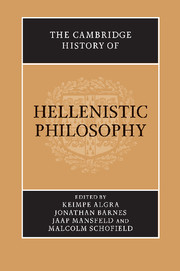Book contents
- Frontmatter
- PART I INTRODUCTION
- PART II LOGIC AND LANGUAGE
- PART III EPISTEMOLOGY
- PART IV PHYSICS AND METAPHYSICS
- 11 Hellenistic physics and metaphysics
- 12 Cosmology
- 13 Theology
- 14 Explanation and causation
- 15 Determinism and indeterminism
- 16 Epicurean psychology
- 17 Stoic psychology
- 18 Philosophy, science and medicine
- PART V ETHICS AND POLITICS
- Synopsis of principal events
- Editions of sources and fragments
- List of abbreviations
- Bibliography
- Index locorum
- General Index
- References
15 - Determinism and indeterminism
from PART IV - PHYSICS AND METAPHYSICS
Published online by Cambridge University Press: 28 March 2008
- Frontmatter
- PART I INTRODUCTION
- PART II LOGIC AND LANGUAGE
- PART III EPISTEMOLOGY
- PART IV PHYSICS AND METAPHYSICS
- 11 Hellenistic physics and metaphysics
- 12 Cosmology
- 13 Theology
- 14 Explanation and causation
- 15 Determinism and indeterminism
- 16 Epicurean psychology
- 17 Stoic psychology
- 18 Philosophy, science and medicine
- PART V ETHICS AND POLITICS
- Synopsis of principal events
- Editions of sources and fragments
- List of abbreviations
- Bibliography
- Index locorum
- General Index
- References
Summary
The origins of the question
The notion of universal causation was ubiquitous in later antiquity; to loosen those ties threatened the irruption of chaos. How could the evident continuity and regularity of the world survive the intervention of casual elements into its structure? Still, there is a clear distinction, one exploited by the Epicureans, between the assertion of a universal principle of causation and any determinism. It is one thing to accept that every event is caused, quite another to believe that the nature and sequence of all events is rigidly fixed for all eternity. The latter belief forms the core of any determinism – and it is its prima-facie implausibility, along with what are taken to be its unacceptable consequences (for human freedom, for the concept of responsibility), that lays it open to attack.
The origins of the problem in the Greek world were not, however, metaphysical. The Sophistic movement of the late fifth century BC was particularly interested in new forms of forensic argument, especially defence argument. Gorgias' Helen is a case in point: Helen of Troy is innocent of adultery, he argues, because she did what she did either under physical compulsion, or under the influence of love, or at the whim of some god, or persuaded by arguments. In none of these eventualities can she be held responsible for her actions, since in all of them she is compelled by some external force; the list is exhaustive; hence she is not responsible for what she did. Gorgia's rhetorical exercise is not serious philosophy, but it raises serious philosophical points. If our actions are indeed conditioned by factors that lie outside our control, how can we reasonably be held responsible for what we do? Society is, indeed, to blame: Gorgias is the Ur-progenitor of hard determinism.
- Type
- Chapter
- Information
- The Cambridge History of Hellenistic Philosophy , pp. 513 - 541Publisher: Cambridge University PressPrint publication year: 1999
References
- 4
- Cited by



